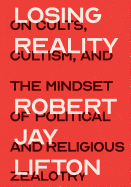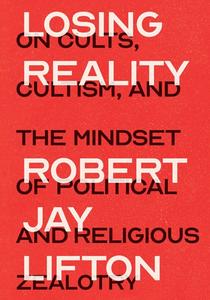
 Preeminent psychiatrist Robert Jay Lifton has spent much of his long professional life studying extremes of human behavior. In Losing Reality: On Cults, Cultism, and the Mindset of Political and Religious Zealotry, he revisits that material through an assortment of subjects--among them Chinese thought reform in the era of Mao Zedong, the Japanese terrorist cult Aum Shinrikyō and Nazi doctors--excerpting portions of his earlier work and updating it with fresh commentary on this unfortunately timely topic.
Preeminent psychiatrist Robert Jay Lifton has spent much of his long professional life studying extremes of human behavior. In Losing Reality: On Cults, Cultism, and the Mindset of Political and Religious Zealotry, he revisits that material through an assortment of subjects--among them Chinese thought reform in the era of Mao Zedong, the Japanese terrorist cult Aum Shinrikyō and Nazi doctors--excerpting portions of his earlier work and updating it with fresh commentary on this unfortunately timely topic.
Grouping these manifestations of "ideological totalism and cultlike behavior" under the label "cultism," Lifton (Witness to an Extreme Century) singles out the "particularly dangerous proclivity of the human mind for extremism." Though that tendency manifested itself in different ways in the massive and deadly project that was Mao's Great Proletarian Cultural Revolution of the 1960s, and in the apocalyptic vision of Aum Shinrikyō's leader Shōkō Asahara, who masterminded a deadly sarin nerve gas attack on the Tokyo subway system in 1995, Lifton makes a persuasive case that the underlying impulses of these gurulike leaders and their enraptured followers were frighteningly similar.
Particularly disturbing is the excerpt from Lifton's 1986 book, The Nazi Doctors. In it, he describes, in clinical and yet chilling terms, "the transformation of the physician--of the medical enterprise itself--from healer to killer." Even at a remove of more than seven decades from these horrific events, his account of the way this regime of death moved "from coercive sterilization to direct medical killing to the death camps" loses none of its power to shock.
For all the depravity reflected in these accounts, the most controversial section of Losing Reality may be the brief one on Donald Trump, whose "cultism," Lifton argues, is "inseparable from his solipsistic reality." Though he stops short of characterizing the 45th president as a dangerous classic guru, or attributing directly to him an apocalyptic narrative, he's unsparing in asserting that Trump is "psychologically remarkable in his capacity to manufacture and continuously assert falsehood in the apparent absence of psychosis."
As one would hope from a capable physician, Lifton offers at least a tentative remedy for these most virulent forms of ideological extremism. Drawing on a piece first published in 1993, he points to the need to develop the "protean self," what he calls "a view of the self as always in process; as being many-sided rather than monolithic and resilient rather than fixed." Given the dire consequences of the zealots' ideologies chronicled in his book, it's fair to ask whether there's any other rational choice. --Harvey Freedenberg, freelance reviewer
Shelf Talker: Robert Jay Lifton returns to his classic works on the dangers of extremist cults and updates them with new material.

